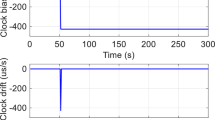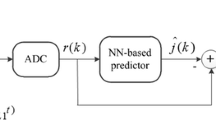Abstract
Accurate timing is one of the key features of the Global Positioning System (GPS), which is employed in many critical infrastructures. Any imprecise time measurement in GPS-based structures, such as smart power grids, economic activities, and communication towers, can lead to disastrous results. The vulnerability of the stationary GPS receivers to the time synchronization attacks (TSAs) jeopardizes the GPS timing precision and trust level. In the past few years, studies suggested the adoption of estimators to follow the authentic trend of the clock offset information under attack conditions. However, the estimators would lose track of the authentic signal without proper knowledge of the signal characteristics. Therefore, a multi-layer perceptron neural network (MLP NN) is proposed to follow the trend of the data. The main difference between the proposed method and typical estimators is the reliance of the network on the training information consisting of signal features. The proposed MLP NN performance has been evaluated through two real-world datasets and two well-known types of TSA. The root mean square error results exhibit an improvement of at least six times compared to other conventional and state-of-art methods.














Similar content being viewed by others
Data availability
The first dataset belongs to Lee et al. (2019) and is available at https://github.com/junhwanlee95/Robust-Estimator. The second dataset that verifies the findings of this study is available from the corresponding author upon reasonable request.
References
3GPP2 (2004) Recommended minimum performance standards for cdma2000 spread spectrum base stations
Axelrad P, Brown RG (1996) GPS navigation algorithms. Global positioning system: theory and applications, vol I. American Institute of Aeronautics and Astronautics, Washington, pp 409–433
Bhamidipati S, Kim KJ, Sun H, Orlik PV (2019) Wide-area GPS time monitoring against spoofing using belief propagation. In 16th annual IEEE international conference on sensing, communication, and networking (SECON). IEEE, pp 1–8
Bonebrake C, O’Neil RL (2014) Attacks on GPS time reliability. IEEE Secur Priv 12(3):82–84
Borre K, Akos DM, Bertelsen N, Rinder P, Jensen SH (2007) A software-defined GPS and Galileo receiver, a single frequency approach. Springer, Birkhauser Boston
Diggelen F, Enge P, (2015) The world’s first GPS MOOC and worldwide laboratory using smartphones. In Proceedings of the 28th international technical meeting of the satellite division of the institute of navigation (ION GNSS+ 2015), pp 361–369
Fan X, Du L, Duan D (2018a) Synchrophasor data correction under GPS spoofing attack: a state estimation-based approach. IEEE Trans Smart Grid 9(5):4538–4546
Fan X, Pal S, Duan D, Du L (2018) Closed-form solution for synchrophasor data correction under GPS spoofing attack. In IEEE Power & Energy Society General Meeting (PESGM). IEEE, pp 1–5
Ghorbani K, Orouji N, Mosavi MR (2020) Navigation message authentication based on one-way hash chain to mitigate spoofing attacks for GPS L1. Wireless Pers Commun 113(4):1743–1754
Google (2020) Raw GNSS measurements. https://developer.android.com/guide/topics/sensors/gnss. Accessed 2020
Hagan MT, Menhaj MB (1994) Training feedforward networks with the Marquardt algorithm. IEEE Trans Neural Networks 5(6):989–993
Haykin SO (2009) Neural networks and learning machines, 3rd edn. Pearson, London
Heng L, Chou D, Gao GX (2014) Reliable GPS-based timing for power systems: a multi-layered multi-receiver architecture. Inside GNSS, November/December 2014
Jiang X, Zhang J, Harding BJ, Makela JJ, Dominguez-Garcia AD (2013) Spoofing GPS receiver clock offset of phasor measurement units. IEEE Trans Power Syst 28(3):3253–3262
Karim R (2019) Counting No. of parameters in deep learning models. Towards data science. https://towardsdatascience.com/counting-no-of-parameters-in-deep-learning-models-by-hand-8f1716241889. Accessed 2019.
Khalajmehrabadi A, Gatsis N, Akopian D (2018a) Evaluation of the detection and mitigation of time synchronization attacks on the global positioning system. In 2018 IEEE/ION Position, Location and Navigation Symposium (PLANS). IEEE, pp 1368–1371
Khalajmehrabadi A, Gatsis N, Akopian D, Taha AF (2018) Real-time rejection and mitigation of time synchronization attacks on the global positioning system. IEEE Trans Industr Electron 65(8):6425–6435
LeCun YA, Bottou L, Orr GB, Müller KR (2012) Efficient BackProp. In: Montavon G, Orr GB, Müller KR (eds) Neural networks: tricks of the trade. Springer, Berlin, pp 9–48
Lee J, Taha AF, Gatsis N, Akopian D (2019) Tuning-free, low memory robust estimator to mitigate GPS spoofing attacks. IEEE Control Systems Letters 4(1):145–150
Lewandowski W, Petit G, Thomas C (1993) Precision and accuracy of GPS time transfer. IEEE Trans Instrum Meas 42(2):474–479
Li X, Ge M, Dai X, Ren X, Fritsche M, Wickert J, Schuh H (2015) Accuracy and reliability of multi-GNSS real-time precise positioning: GPS, GLONASS, BeiDou, and Galileo. J Geodesy 89(6):607–635
Luenberger D (1966) Observers for multivariable systems. IEEE Trans Autom Control 11(2):190–197
Magiera J (2019) A multi-antenna scheme for early Detection and mitigation of intermediate GNSS spoofing. Sensors 19(10):2411
Martin KE (2011) Synchrophasor standards development - IEEE C37.118. In 2011 44th Hawaii international conference on system sciences. IEEE, pp 1–8
Mosavi MR (2006) Comparing DGPS corrections prediction using neural network, fuzzy neural network, and Kalman filter. GPS Solut 10(2):97–107
Mosavi MR, Baziar AR, Moazedi M (2017) De-noising and spoofing extraction from position solution using wavelet transform on stationary single-frequency GPS receiver in immediate detection condition. J Appl Res Technol 15(4):402–411
Mosavi MR, Shafiee F (2016) Narrowband interference suppression for GPS navigation using neural networks. GPS Solutions 20(3):341–351
Mosavi MR, Tabatabaei A, Zandi MJ (2016) Positioning improvement by combining GPS and GLONASS based on Kalman filter and its application in GPS spoofing situations. Gyroscop Navig 7(4):318–325
Musleh AS, Chen G, Dong ZY (2019) A survey on the detection algorithms for false data injection attacks in smart grids. IEEE Transactions on Smart Grid 11(3):2218–2234
Psiaki ML, O’Hanlon BW, Bhatti JA, Shepard DP, Humphreys TE (2013) GPS spoofing detection via dual-receiver correlation of military signals. IEEE Trans Aerosp Electron Syst 49(4):2250–2267
Riedel C, Fu G, Beyette D, Liu JC (2019) Measurement system timing integrity in the presence of faults and malicious attacks. In: Paper presented at international conference on smart grid synchronized measurements and analytics (SGSMA). IEEE, pp 1–8.
Schmidt D, Radke K, Camtepe S, Foo E, Ren M (2016) A Survey and analysis of the GNSS spoofing threat and countermeasures. ACM Comput Surv 48(4):1–31
Schmidt E, Lee J, Gatsis N, Akopian D (2020) Rejection of smooth GPS time synchronization attacks via sparse techniques. IEEE Sens J 21(1):776–789
Schmidt E, Ruble Z, Akopian D, Pack DJ (2019) Software-defined radio GNSS instrumentation for spoofing mitigation: a review and a case study. IEEE Trans Instrum Meas 68(8):2768–2784
Shafiee E, Mosavi MR, Moazedi M (2018) Detection of spoofing attack using machine learning based on multi-layer neural network in single-frequency GPS receivers. J Navig 71(1):169–188
Shepard DP, Humphreys TE, Fansler AA (2012) Evaluation of the vulnerability of phasor measurement units to GPS spoofing attacks. Int J Crit Infrastruct Prot 5(3–4):146–153
Siamak S, Dehghani M, Mohammadi M (2020) Dynamic GPS spoofing attack detection, localization, and measurement correction exploiting PMU and SCADA. IEEE Syst J. https://doi.org/10.1109/JSYST.2020.3001016
Wang Y, Chakrabortty A (2016) Distributed monitoring of wide-area oscillations in the presence of GPS spoofing attacks. In 2016 IEEE power and energy society general meeting (PESGM). IEEE, pp 1–5.
Xie J, Meliopoulos APS (2020) Sensitive detection of GPS spoofing attack in phasor measurement units via quasi-dynamic state estimation. Computer 53(5):63–72
Zhang Z, Zhan X (2016) GNSS spoofing network monitoring based on differential pseudorange. Sensors 16(10):1771
Zhu F, Youssef A, Hamouda W (2016) Detection techniques for data-level spoofing in GPS-based Phasor measurement units. In: Paper presented at 2016 international conference on selected topics in mobile & wireless networking (MoWNeT). IEEE, pp 1–8
Author information
Authors and Affiliations
Corresponding author
Additional information
Publisher's Note
Springer Nature remains neutral with regard to jurisdictional claims in published maps and institutional affiliations.
Rights and permissions
About this article
Cite this article
Orouji, N., Mosavi, M.R. A multi-layer perceptron neural network to mitigate the interference of time synchronization attacks in stationary GPS receivers. GPS Solut 25, 84 (2021). https://doi.org/10.1007/s10291-021-01124-z
Received:
Accepted:
Published:
DOI: https://doi.org/10.1007/s10291-021-01124-z




